Burundi government accuses EU of having dictated the recent UN report to destabilize the country.
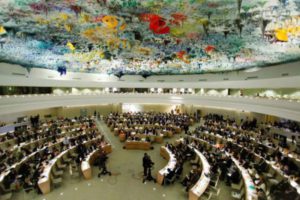
In Geneva, the resolution was adopted to the great displeasure of Bujumbura.
The UN Council for Human Rights adopted on 30 September in Geneva, Switzerland, a resolution on Burundi by setting up an independent commission of inquiry which will determine the perpetrators of violations of human rights in Burundi and propose sanctions against them within a year.
This resolution follows the publication of a UN report on 20 September, accusing the government of Burundi of being responsible for systematic and consistent serious human rights violations, and warned against possible crimes against humanity and a danger of genocide.
Proposed by Slovakia, on behalf of the European Union, Resolution A / HRC / 33 / L.31 was approved by 19 votes, 21 abstentions and 7 countries including Morocco, Russia, China and Venezuela voted against it.
“Investigators will conduct a thorough investigation into human rights violations committed in Burundi since April 2015, in particular to assess the extent and determine whether they are crimes under international law”, says the resolution. The latter also indicates that the commission will present its initial findings at the 34th session of the Council in March 2017. Investigators will “identify the perpetrators” of such violations and “make recommendations on measures to be taken to ensure that the perpetrators of these acts are held to account.” Indeed, the Commissioners will establish whether or not these abuses constitute international crimes that can be prosecuted by the International Criminal Court.
Bujumbura denounces a plot
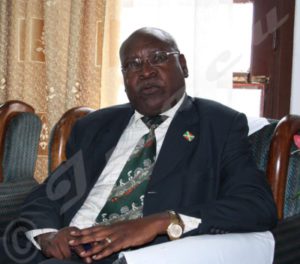
Philippe Nzobonariba “This resolution is inapplicable to Burundi.”
The Government of Burundi has been quick to react on this resolution. “It contains countless lies and affirmations based on a report highly contested by my government,” said Tabu Rénovat, Ambassador of Burundi to the Council.
The resolution was equally rejected by Philippe Nzobonariba, the spokesperson and Secretary of Burundi government: “The government finds that the text was prepared, submitted and approved by the European Union that has appropriated the findings of the report produced on 9 September, 2016 by three experts of a so-called UN Independent Inquiry on Burundi.
A biased report that was commissioned and produced for the sole purpose of preparing the way for this resolution and to destabilize Burundi, “he said in a press release issued last Monday,3 October, 2016.
He added that the Government of Burundi had produced and transmitted within the prescribed time, a shadow report to the Council of Human Rights in order to clarify the points of disagreement over the report and thus, enable the Council to have balanced elements to offer an acceptable resolution: “It is regrettable that these answers were not taken into account when drafting the resolution.”
For Burundi government, there was rather a clear and deliberate attempt not to publish them along with the report’s findings, to give to the opinion the only negative and alarmist vision on Burundi. He also indicated that excessively unjust measures taken against Burundi only aim to “divide the defense and security forces which constitute a rampart the enemies of Burundi independence cannot break down.” According to the spokesman of the government, this text is inapplicable to Burundi.
A tit for tat response
Within the framework of the follow-up of the 14 March 2016 decision adopted pursuant to Article 96 of the Cotonou Agreement, a meeting was held on 3 October between the government and EU delegation. The shadow of this resolution hovered.
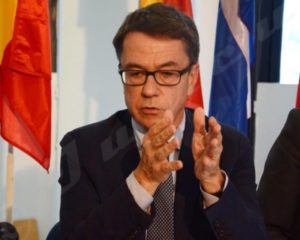
Koen Vervaeke, “We encourage the Government of Burundi to cooperate and I think it is in their interest.”
A government statement released by Alain Aimé Nyamitwe,the Foreign Affairs Minister, after the meeting states that “the few challenges cannot be the reason to call for an unacceptable resolution that only comes to undermine Burundi.”
On a more or less conciliatory tone, Burundi government finds that EU initiative for a draft resolution cannot go in the direction of the positive reconstruction of its relationship with Burundi. “The government got the opportunity to prove that the human rights situation is not as bad as EU presents it.”
According to Bujumbura, UN investigators have not met Burundi government and “gratuitous assertions presented as conclusions are biased and are losing credibility in the report and EU is behind this resolution.”
The EU’s response was quick. “We made inquiries in Geneva. There have been many contacts with several ministers. They met with the Ministers of Public Security, Human Rights, Justice, Defense, the 1st Vice President etc. It is a job that is quite professional, “replied Koen Vervaek, the director general for Africa within the European external Action Service.
As for the report that would have been guided by EU, the head of the EU delegation refutes this assertion of the government. “It’s obviously not true. We need to be clear about that. Among the independent experts, two were from the African continent and one from Latin America. There were no European experts in this panel. We now urge the Burundian government to cooperate with the Council of human rights and I believe it is in their interest. ”
The Shadow of ICC
ICC has opened a preliminary examination into crimes committed in Burundi. The resolution initiated by EU also takes note of this action and demands full cooperation of the Burundian government. For Bujumbura, it is the destabilization plan that continues.
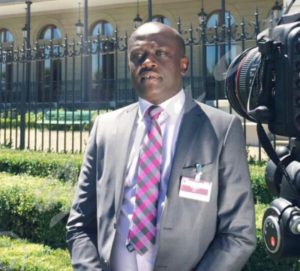
Armel Niyongere “Instead of rejecting the commission of inquiry or ICC investigation, Burundian authorities could begin to investigate and conduct relevant proceedings. “
After the opening by the International Criminal Court (ICC) to a preliminary examination into crimes committed in Burundi since April 2015, Bujumbura seeks allies. In an information note addressed to the group of African Ambassadors accredited to The Hague, Burundi government requests the support of the latter against the opening of a preliminary review of the situation in Burundi by ICC. “The Government and people of Burundi vehemently oppose and reject this decision as ill-conceived and unjustified in law and in fact,” wrote Vestine Nahimana, Ambassador of Burundi in the Netherlands.
“Burundi does not deny the fact that people have died. The claim that people have died in Burundi does not justify legally in the spirit of the Statute, the intervention of the ICC prosecutor. This is not a valid basis to intervene following alleged criminal acts of killing, imprisonment, torture, rape and other forms of sexual violence, as well as cases of enforced disappearances. ”
According to Burundi government, conducting the preliminary examination encourages potentially negative forces and their acolytes to heighten violence.” Burundi is a victim of Nickel deposits which are around 10% of the world production.
The decision by the Burundian Government to manage the mineral resources for the benefit of the people of Burundi led Belgium- its former colonial power and a greater part of the West, to use their powerful international institutions to encourage the regime change. ”
The collective of victims steps into the breach
“Burundi is one of the states that ratified the Rome Statute which means that ICC can exercise jurisdiction in respect of acts of genocide, crimes against humanity or war crimes committed in Burundi or by Burundi nationals, “said Armel Niyongere, one of the lawyers of the group of the victims’ families of crimes committed in Burundi.
According to him, this exercise should determine whether or not it is possible to open an investigation and he believes that ICC will conduct investigation since it has sufficient information. “As lawyers of victims, we are ready to cooperate with the commission of inquiry and if necessary with ICC. We hold sufficient evidence.”
As for the principle of complementarity brandished by Burundi government, Armel Niyongere finds this Bujumbura defense funny. “There is a principle of complementarity when the national courts had commissioned credible and independent investigations. You know that there is no investigation because of the manipulation of the Burundian justice by the executive. Judges are now activists of the ruling parties. “According to him, the lack of willingness of the local judicial authorities to conduct credible investigations is one of the criteria to refer to ICC.
“Instead of rejecting the commission of inquiry or ICC investigation, Burundian authorities could begin to investigate and conduct relevant proceedings. But they are afraid of being prosecuted for acts committed. ”
Reactions
“Let me make fun of the EU”
Willy Nyamitwe, Senior Communication Advisor of President Nkurunziza explains himself…
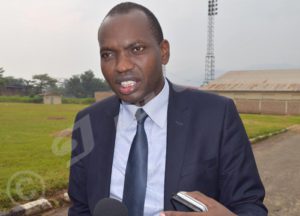
Armel Niyongere “Instead of rejecting the commission of inquiry or ICC investigation, Burundian authorities could begin to investigate and conduct relevant proceedings. “
Why is this resolution inapplicable to Burundi?
It is a resolution that made its own the conclusions of a biased report and which contains falsehood and therefore inapplicable. Moreover, the majority of Council members have not approved it. This means EU has no more influence over Africa.
And those who say that abstentions are a consent?
(Laughing) Let me make fun of EU. Abstention is a silence that tells a lot. That silence says to EU that it is a power, it can crush Burundi as it wishes, but we as Africa, will not help EU to crush it. So we refrain. This does not mean that Africa swallows this European mismanagement. Abstentions did not help us a great deal, but it is at least a strong message to EU.
Don’t insults hurled against EU worsen the relations and penalize Burundi?
What worsens diplomatic relations is rather that EU hard-line attitude.
This behavior of a fait accompli. EU, which imposes sanctions against Burundian officials and makes every effort to destabilize Burundi.
Isn’t Bujumbura responsible for that?
It is EU that is creating problems for which it will be held accountable in the near future. We see the results in other countries with the same modus operandi. It is a flow of refugees who go to Europe and the latter is struggling to contain it. We are not at fault for what might happen in European countries in the near future because of bad decisions made by individuals who lead EU.
Isn’t he fact of mobilizing demonstrations every day a sign of fear?
We are not afraid of anyone, any organization or any entity. We have the responsibility to refer to our own laws to lead our country. People of Burundi have their right to express joy or displeasure. What happened last week is a personal initiative of the people outraged by the excessive politicization of human rights. We did not mobilize anybody.
And those who claim that Burundi should be placed under Chapter VII?
Chapter VII is a provision of imposition, but we’re not there yet. Let’s wait until this debate arises. Burundi knows that EU can push things so far as to get that imposition from the UN Security Council, but we remain confident that we will not get to that point. We are sure to win this umpteenth victory in this war of gossip and destabilization.
Are you ready to welcome this commission of inquiry?
The continuation in the management of all the results from this biased report, this imposed resolution and relations between the government and some UN agencies will trace the route for us.
For now, we keep in mind that the resolution is inapplicable because it is biased in more ways than one.
Koen Vervaeke, Director General for the European External Action Service for Africa
 For him, where Europe has played a role is in the writing of the conclusion of the Council of Human Rights: “We tried to do it together with Burundi and the African group in order to reach a consensual conclusion, but unfortunately there has been no willingness to cooperate from the Burundian government.”
For him, where Europe has played a role is in the writing of the conclusion of the Council of Human Rights: “We tried to do it together with Burundi and the African group in order to reach a consensual conclusion, but unfortunately there has been no willingness to cooperate from the Burundian government.”
Armel Niyongere, president of ACAT-Burundi
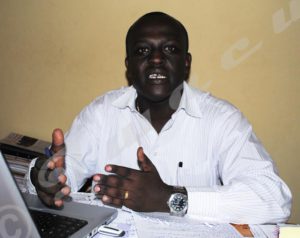 “An ultimatum should be given to the government and a threat to refer the matter to the UN General Assembly for the suspension or expulsion of Burundi from the Council of Human Rights for non-cooperation should be issued. I think it is feasible and Burundi will be in the category of outlawed states”, Niyongere warns.
“An ultimatum should be given to the government and a threat to refer the matter to the UN General Assembly for the suspension or expulsion of Burundi from the Council of Human Rights for non-cooperation should be issued. I think it is feasible and Burundi will be in the category of outlawed states”, Niyongere warns.
Jeremie Minani, Cnared spokesman
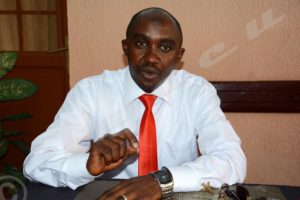 “This refusal is a continuation of distrust that Pierre Nkurunziza and his regime have always displayed in respect of the East African, African, European and UN initiatives aimed to find a political solution to the crisis in Burundi and stop the crimes that result from it. If Burundi regime accuses itself of nothing, why did it refuse the establishment of a United Nations commission of inquiry?
“This refusal is a continuation of distrust that Pierre Nkurunziza and his regime have always displayed in respect of the East African, African, European and UN initiatives aimed to find a political solution to the crisis in Burundi and stop the crimes that result from it. If Burundi regime accuses itself of nothing, why did it refuse the establishment of a United Nations commission of inquiry?
This refusal is simply evidence demonstrating satisfactorily that the regime wants to hide or cover war crimes, crimes against humanity and acts of genocide for which it is responsible, in order to escape prosecution before international justice. The only thing left is the activation of UN mechanisms namely Chapter VII.
Radjabu, former CNDD-FDD president in exile
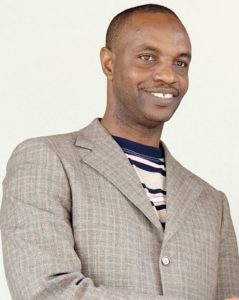 “After several years of prevarication and trial and error that resulted in loss of lives, an increasing flow of refugees abroad and many cases of illegal imprisonments, the international community has finally made a significant progress in its efforts to resolve the crisis in Burundi. It reacted against this political system designed with a view to remain in power forever. ”
“After several years of prevarication and trial and error that resulted in loss of lives, an increasing flow of refugees abroad and many cases of illegal imprisonments, the international community has finally made a significant progress in its efforts to resolve the crisis in Burundi. It reacted against this political system designed with a view to remain in power forever. ”
Athanase Karayenga, communication specialist
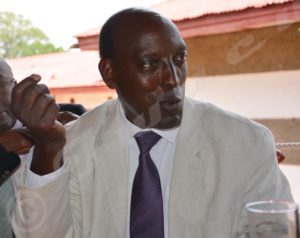 “Burundi government does nothing but spread lies about the situation in Burundi. It is their way of ruling: lying, denying, fabricating … The international community could not consider before that a government can lie shamelessly. Today, it doesn’t believe that anymore, and this resolution is a proof. If the government accepted demonstrations against itself, streets would be filled with people. “
“Burundi government does nothing but spread lies about the situation in Burundi. It is their way of ruling: lying, denying, fabricating … The international community could not consider before that a government can lie shamelessly. Today, it doesn’t believe that anymore, and this resolution is a proof. If the government accepted demonstrations against itself, streets would be filled with people. “

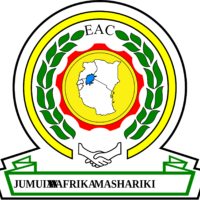
















 IWACU Open Data
IWACU Open Data

